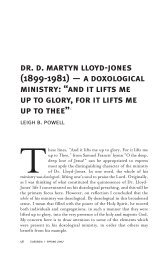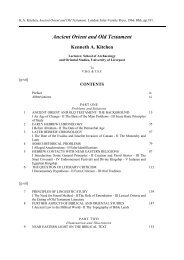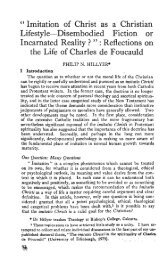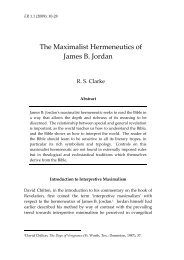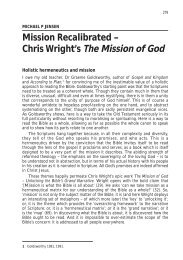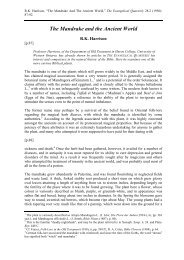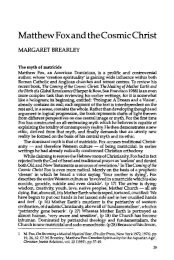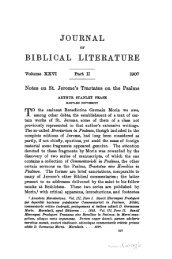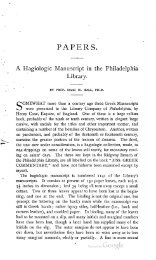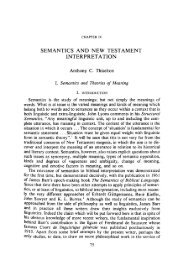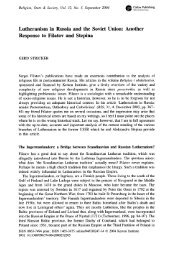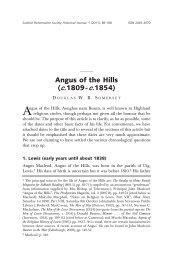The Language of the Epistle to the Hebrews as Bearing upon Its ...
The Language of the Epistle to the Hebrews as Bearing upon Its ...
The Language of the Epistle to the Hebrews as Bearing upon Its ...
Create successful ePaper yourself
Turn your PDF publications into a flip-book with our unique Google optimized e-Paper software.
LANGUAGE OF THE EPISTLE TO THE HEBREWS.<br />
23<br />
mitted <strong>to</strong> us no writing with which <strong>to</strong> institute a comparison (<strong>the</strong><br />
spuriousness <strong>of</strong> <strong>the</strong> epistle attributed <strong>to</strong> him being admitted),l and in<br />
having been a Hellenistic Jew, likely <strong>to</strong> have written somewhat better<br />
Greek than S. Paul. His birthplace also w<strong>as</strong> in <strong>the</strong> Levant, in Cyprus,<br />
where he could have had <strong>the</strong> full benefit <strong>of</strong> Alexandrian literature.<br />
Being at Jerusalem he became one <strong>of</strong> <strong>the</strong> very early converts <strong>to</strong><br />
Christianity, long before S. Paul, and he w<strong>as</strong> a man <strong>of</strong> property and<br />
benevolence; for although a Cypriote, he had land in Jerusalem and<br />
sold it <strong>to</strong> relieve <strong>the</strong> necessities <strong>of</strong> <strong>the</strong> early Christian community<br />
(Acts iv. 36, 37). A very few writers, indeed, have identified him<br />
with "Joseph called Barsab<strong>as</strong>, who w<strong>as</strong> surnamed Justus," <strong>of</strong> Acts i.<br />
23, and this is countenanced by <strong>the</strong> Codex Bezae and <strong>the</strong> AEthiopic<br />
reading papvai3av; and in this c<strong>as</strong>e he must have been an original<br />
disciple, and would be excluded by <strong>the</strong> language <strong>of</strong> Heb. ii. 3. But<br />
<strong>the</strong>re seems <strong>to</strong> be no ground for <strong>the</strong> identification, which, indeed, is<br />
generally rejected. In Acts iv. 36 <strong>the</strong> language implies that Barnab<strong>as</strong><br />
is <strong>the</strong>re spoken <strong>of</strong> for <strong>the</strong> first time, <strong>the</strong> names <strong>the</strong>mselves are different,<br />
and Barsab<strong>as</strong> w<strong>as</strong> known by <strong>the</strong> surname <strong>of</strong> Justus, which does<br />
not appear <strong>to</strong> have been ever given <strong>to</strong> Barnab<strong>as</strong>. He is next heard<br />
1 <strong>The</strong> following memorandum <strong>of</strong> <strong>the</strong> authorities for and against <strong>the</strong> genuineness<br />
<strong>of</strong> <strong>the</strong> <strong>Epistle</strong> <strong>of</strong> Barnab<strong>as</strong>, and for its date, h<strong>as</strong> been kindly furnished me by <strong>the</strong><br />
Rev. E. C. Richardson, Librarian <strong>of</strong> <strong>the</strong> Hartford <strong>The</strong>ological School: -<br />
Genuineness, etc. For: Origen, Clement <strong>of</strong> A., Eusebius, Hieron., Apost. const.,<br />
Voss, Hammond, Pearson, Bull, Cave, Du Pin, Grynaeus, Wake, Lardner, Fleury,<br />
Le Nourry, Russel, Galland, Less, Rosenmiiller, Muenscher, Staudlin, Danz, Bertholdt,<br />
Hemsen, Schmidt, Henke, Bleek, R6rdam, Gieseler, Nabe, Credner, Bretschneider,<br />
Guericke, Francke, Gfr6rer, Mohler, Baumgarten-Crusius, De Wette (?),<br />
Rysewyk, Schneckenburger, Sprinzl, Alzog, Nirschl, Sharpe. Against: Rivet,<br />
Usher, Menard, Daille, Papebroch, Calmet, Cotelerius, Le Moyne, Tenzel, Natalis<br />
Alex., Ittig, Spanheim, Tillemont, B<strong>as</strong>nage, Oudin, Ceillier, S<strong>to</strong>lle, Pertsch, Baumgarten,<br />
Walch, Mosheim, Semler, Schroekh, R6ssler, Starke, Lumper, Michaelis,<br />
Gaab, Lange, Hanlein, Winter, Neander, Ullmann, Mynster, Hug, Baur, Winer,<br />
Il<strong>as</strong>e, Ebrard, Semisch, Kayser, Reithmayr, Hefele, MacKenzie, Lipsius, Weizacker,<br />
Donaldson, Roberts and D., Riggenbach, Westcott, Braunsberger, Cunningham,<br />
Funk, Alford. Interpolated. Schenkel, Heydecke.<br />
Date. Reign <strong>of</strong> Vesp<strong>as</strong>ian, Menardus, Ewald, Weizacker, Milligan; 71-73,<br />
Galland; 70-Ioo, Tischendorf (at first); reign <strong>of</strong> Domitian, Wieseler, Hilgenfeld,<br />
Riggenbach. Donaldson, Reuss, Ewald, Dressel, and Ritschl also put it in <strong>the</strong><br />
first century. Papebroch pronounces for some time later than 97, Hefele for<br />
107-20, Volkmar, Tischendorf (later), Baur, and o<strong>the</strong>rs, for I19; Tentzel for <strong>the</strong><br />
reign <strong>of</strong> Trajan; and Hug, Ullmann, Liicke, Neander, Winer, Zeller, and K6stlin<br />
for some time early in <strong>the</strong> 2d century, while Heydecke distinguishes in<strong>to</strong> a<br />
genuine B., 70-71, and an inteipola<strong>to</strong>r, II9-I2I.




